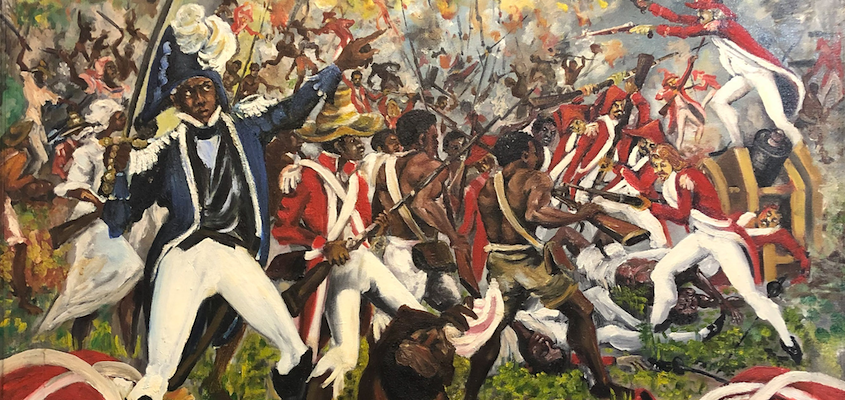BLACK AGENDA REPORT

November 18, 1803, represents a glorious day in the history of Haiti, the history of Africans in the Americas, and the history of oppressed peoples worldwide in the battle against colonial repression. On that day an army of Africans, led by Jean Jacques Dessalines, trounced Napoleon Bonaparte’s expeditionary forces (prompting the sale of the Louisiana Territory to the United States ) during what has become known as the Battle of Vertières. After more than a decade of revolt and counter-revolution the French hold on their once-lucrative colony of Saint-Domingue was severed, the cruel plantation economy destroyed, and the system of white supremacy on which rested obliterated. The French commander Donatien de Rochambeau surrendered to African revolutionary forces, and the French retreated from Saint-Domingue. Two months later, on January 1, 1804, Dessalines proclaimed the independence of Haiti.
For Haitians, memory of the Battle of Vertières is a source of national pride, signifying not only a profound desire for sovereignty and freedom, but also the ability, through intelligence, strategy, and commitment, to defeat a larger, better resourced opponent. One could also suggest that the Vertières signifies both persistence and patience. The Haitian Revolution began on August 21, 1791; it took thirteen years of hard struggle before victory was achieved and independence won. It is a lesson to be remembered today in Haiti, when the country is again under a seemingly endless and intractable occupation, but also in the Congo, Sudan, Palestine and other places that the world seems to have abandoned as the savage crush of imperialist terror gets worse. Vertières reminds us that resistance is not futile, that victory will come.
To mark the history of the Battle of Vertières we reprint a 1939 essay by CLR James, written under the pseudonym J.R. Johnson, titled “Revolution and the Negro .” James is writing against the myth, as he calls it, of the “docile negro” — a figure who, according to imperialist historians, was passive, acquiescent, and content. He also writes against the backdrop of global fascism in Europe, and also of the fascism of Europeans in their colonies in Africa and Asia. The revolutionary history of Haiti is at the center of James’ essay, but he approaches it in a global, pan-African perspective, seeing a continuity between the revolt in Haiti and the Black revolts in the greater Caribbean, the United States, and in Africa. James concludes with a prognosis for the future: “In Africa, in America, in the West Indies, on a national and international scale, the millions of Negroes will raise their heads, rise up from their knees, and write some of the most massive and brilliant chapters in the history of revolutionary socialism.” That was in 1939. New chapters are writing themselves now.
CLR James’ “Revolution and the Negro” is reproduced below.
Revolution and the Negro
by J.R. Johnson [CLR JAMES]
The Negro’s revolutionary history is rich, inspiring, and unknown. Negroes revolted against the slave raiders in Africa; they revolted against the slave traders on the Atlantic passage. They revolted on the plantations.
The docile Negro is a myth. Slaves on slave ships jumped overboard, went on vast hunger strikes, attacked the crews. There are records of slaves overcoming the crew and taking the ship into harbor, a feat of tremendous revolutionary daring. In British Guiana during the eighteenth century the Negro slaves revolted, seized the Dutch colony, and held it for years. They withdrew to the interior, forced the whites to sign a treaty of peace, and have remained free to this day. Every West Indian colony, particularly Jamaica and San Domingo and Cuba, the largest islands, had its settlements of maroons, bold Negroes who had fled into the wilds and organized themselves to defend their freedom. In Jamaica the British government, after vainly trying to suppress them, accepted their existence by treaties of peace, scrupulously observed by both sides over many years, and then broken by British treachery. In America the Negroes made nearly 150 distinct revolts against slavery. The only place where Negroes did not revolt is in the pages of capitalist historians. All this revolutionary history can come as a surprise only to those who, whatever International they belong to, whether Second, Third, or Fourth, have not yet ejected from their systems the pertinacious lies of Anglo-Saxon capitalism. It is not strange that the Negroes revolted. It would have been strange if they had not.
But the Fourth International, whose business is revolution, has not to prove that Negroes were or are as revolutionary as any group of oppressed people. That has its place in agitation. What we as Marxists have to see is the tremendous role played by Negroes in the transformation of Western civilization from feudalism to capitalism. It is only from this vantage-ground that we shall be able to appreciate (and prepare for) the still greater role they must of necessity play in the transition from capitalism to socialism.
What are the decisive dates in the modern history of Great Britain, France, and America? 1789, the beginning of the French Revolution; 1832, the passing of the Reform Bill in Britain; and 1865, the crushing of the slave-power in America by the Northern states. Each of these dates marks a definitive stage in the transition from feudal to capitalist society. The exploitation of millions of Negroes had been a basic factor in the economic development of each of these three nations. It was reasonable, therefore, to expect the Negro question to play no less an important role in the resolution of the problems that faced each society. No one in the pre-revolutionary days, however, even faintly foresaw the magnitude of the contributions the Negroes were to make. Today Marxists have far less excuse for falling into the same mistake.
Black Agenda Report for more
